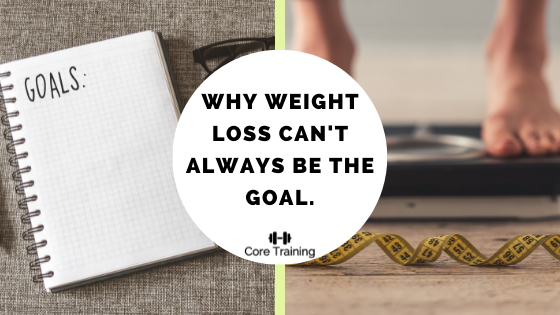Why weight loss can't always be the goal.
I’m going to start this blog by making an assumption - so if this assumption does not apply to you then 1) I apologise, and 2) what you read below probably won’t be relevant to you! My assumption is this: at some point in your life, you have actively tried to lose weight.
The chances are, nearly everyone reading this blog will agree with that statement. Let me be clear: there is nothing wrong with that. Weight loss is a worthy and legitimate goal for someone to have, and can have a hugely positive impact on your health. In fact, studies have shown that just attempting to lose weight, even if no weight loss is achieved, can actually improve your health. So, by no means am I saying weight loss should never be the goal - but I am saying it shouldn’t always be the goal.
For any of you who have tried losing weight in the past, I have the following question: when was the last time that weight loss wasn’t a goal of yours? When was the last time you weren’t trying, at least on some level, to lose weight? Unfortunately, for many people, weight loss is not only their over-riding goal, but also a never-ending goal. This tends to happen for two reasons:
1) They never actually achieve the weight loss they set out to lose.
2) They don’t think about what happens once they have achieved the desired amount of weight loss.
Now, regardless of why it happens, weight loss being a perpetual goal is something that should never be the case. No matter your circumstances or starting point, you should never end up in the situation where you are always trying to lose weight - and you should regularly go through periods of time where you focus on things that aren’t weight loss. This is for both mental and physical health reasons.
It’s true that the longer you diet for, the more likely it is that your metabolism will slow down - due to restricted calorie consumption. While this change is not permanent, and can be reversed once a dieting phase ends, long-term dieting behaviour can make it harder and harder to lose weight from this physiological factor alone. When you then factor in that weight loss diets require some form of restriction - whether it be in quantities of food, or types of food themselves - and you can also start to see why dieting is not necessarily ‘healthy’ in the long-term. This is one of the reasons why, even if a weight loss target has not yet been achieved, it’s a good idea to only diet for a finite period of time, before entering a period of maintenance for a few months. This allows your body to recover from the dieting phase, as well as giving you more freedom to eat more freely (and hopefully more enjoyably, too).
Dieting also becomes tougher mentally the longer it goes on for. Willpower is finite, and as we remain in a state of calorie restriction, we start to see other negative side effects. Tiredness/lethargy, lack of motivation, lack of focus and low mood are just some of the things we start to see in people who are dieting long-term. These factors thus make it harder to actually stick to a diet, which is why people tend to hit a plateau after dieting for a certain period of time. They feel like they are putting in all the effort to lose weight, without actually losing any weight. Does that sound familiar? In the past, this phenomenon has been wrongly described as starvation mode - something that doesn’t actually exist - where your body stops itself from losing weight out of protection. What is actually happening is that you probably just aren’t sticking to your diet as closely as you once were. You pick at food more, go overboard at weekends, stop exercising or moving as much (meaning less calorie expenditure) and just generally don’t adhere to the diet closely enough to continue to lose weight. You need a break - both mentally and physically - from dieting.
Again, the answer in this scenario is the same as above - take a break from trying to lose weight. Give yourself a few months where you focus on maintaining your weight, allowing your mind and body to recover, and on promoting optimal health through a highly nutritious diet, a good amount of exercise and plenty of rest. Your body will thank you for it, and when (if) the time comes again to lose weight, you will be better prepared for it.
On a more personal level, though, if weight loss is always the goal, it adds up to a pretty miserable existence. Constant restrictions on what you can and can’t eat, an obsessive commitment to exercise, feelings of guilt, negative body image and frequent pain and injuries are just some of the traits that we see in individuals who always have to be losing weight - or at least trying to lose weight. And often, even when weight loss is achieved, it isn’t appreciated - it’s straight onto the next weight loss milestone. This is still the case when people have specific targets laid out: rather than celebrating the monumental achievement of losing 10kg bodyweight, the goalposts get shifted to now wanting to lose another 10kg. It’s unhealthy, and ultimately just sad for the individual.
Losing weight can be a great thing - it can lead to improved quality of life, and can drastically reduce the risk of developing many different diseases - but it should not become ‘everything’. It’s important that we place importance on aspects of health and fitness other than just the number on the scales - else we allow that number to define us, and dominate our thinking. So, if you are sat there, unable to remember the last time you weren’t trying to lose weight, I want you to do just that. Stop trying to lose weight. Stop focusing on the number on the scales alone. Take some time to focus on your health as a whole, and set goals for yourself that aren’t to do with just weighing a specific amount.
In my experience, this obsession with wanting to lose weight, with always being on a diet - rarely ends with happiness, and never ends with success. When weight loss is always the goal, no amount of weight loss will ever be enough - and even successful weight loss isn’t actually appreciated.
And even if you are able to constantly and consistently lose weight, at a certain point that no longer becomes a good thing. After a certain point, losing weight is damaging your health - in extreme cases irreparably. So rather than let that need for weight loss consume and damage you, work towards being in a place where other things matter more. Where you are able to celebrate the amazing things your body can do. Where you can enjoy eating the food you like without guilt. Where you look at your health as not just the number on the scales, but as a series of different things - your emotional health, psychological health, social health and so on.
This doesn’t mean you can never want to lose weight again, nor try to do so. What it does mean, though, is that you are always trying to lose weight, at a certain point you are doing yourself more harm than good. So really reflect on whether you need to take an (extended) break from trying to lose weight, to benefit yourself in the long-term.
If you are struggling with this perpetual weight-loss cycle, or need help setting goals independent of weight loss, then get in touch with us via email at: coretrainingpt@gmail.com


